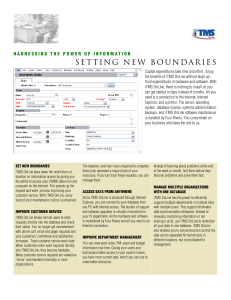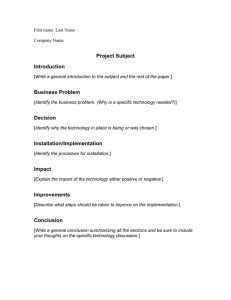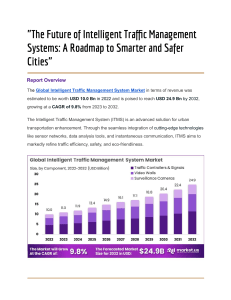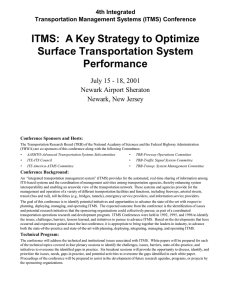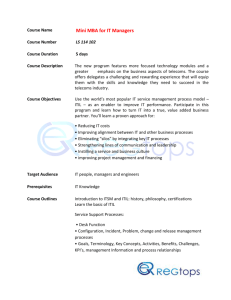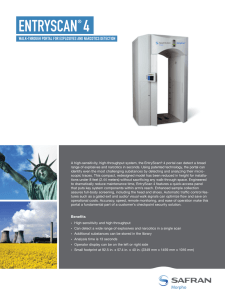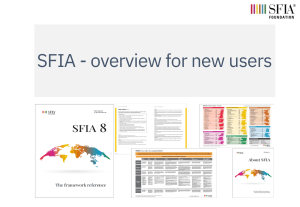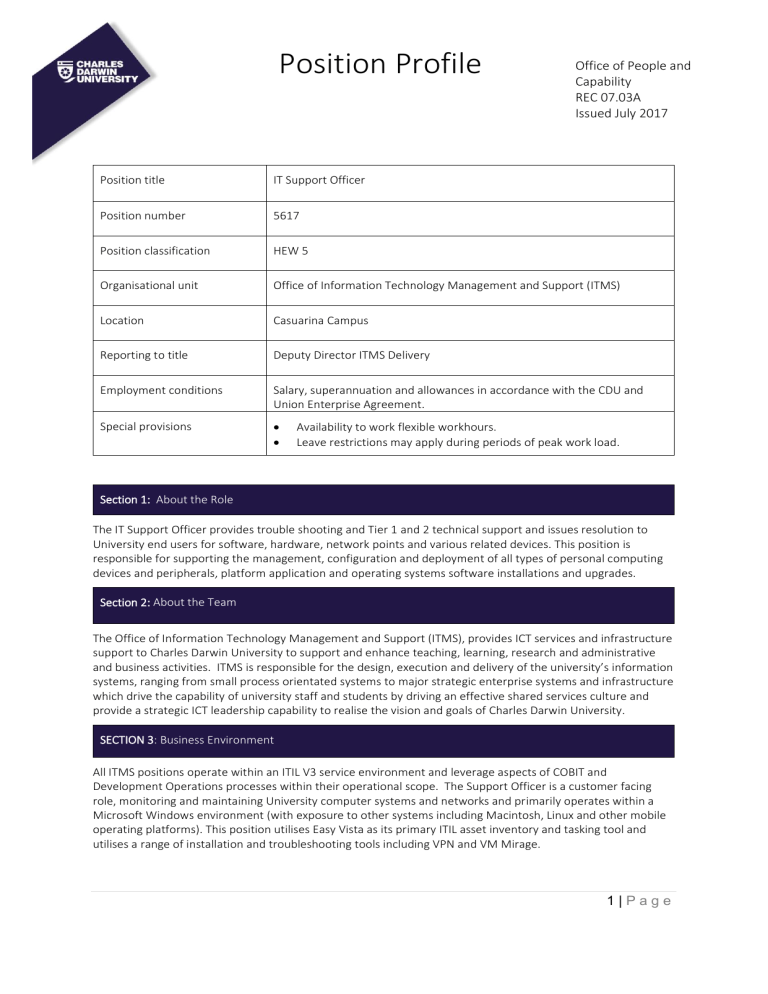
Position Profile Office of People and Capability REC 07.03A Issued July 2017 Position title IT Support Officer Position number 5617 Position classification HEW 5 Organisational unit Office of Information Technology Management and Support (ITMS) Location Casuarina Campus Reporting to title Deputy Director ITMS Delivery Employment conditions Salary, superannuation and allowances in accordance with the CDU and Union Enterprise Agreement. Special provisions • • Availability to work flexible workhours. Leave restrictions may apply during periods of peak work load. Section 1: About the Role The IT Support Officer provides trouble shooting and Tier 1 and 2 technical support and issues resolution to University end users for software, hardware, network points and various related devices. This position is responsible for supporting the management, configuration and deployment of all types of personal computing devices and peripherals, platform application and operating systems software installations and upgrades. Section 2: About the Team The Office of Information Technology Management and Support (ITMS), provides ICT services and infrastructure support to Charles Darwin University to support and enhance teaching, learning, research and administrative and business activities. ITMS is responsible for the design, execution and delivery of the university’s information systems, ranging from small process orientated systems to major strategic enterprise systems and infrastructure which drive the capability of university staff and students by driving an effective shared services culture and provide a strategic ICT leadership capability to realise the vision and goals of Charles Darwin University. SECTION 3: Business Environment All ITMS positions operate within an ITIL V3 service environment and leverage aspects of COBIT and Development Operations processes within their operational scope. The Support Officer is a customer facing role, monitoring and maintaining University computer systems and networks and primarily operates within a Microsoft Windows environment (with exposure to other systems including Macintosh, Linux and other mobile operating platforms). This position utilises Easy Vista as its primary ITIL asset inventory and tasking tool and utilises a range of installation and troubleshooting tools including VPN and VM Mirage. 1|Page SECTION 4: Key Capabilities and relationships required for the role The CDU ITMS Capability Framework applies to all ITMS employees. The capability framework is available at Capability Framework This role also utilises an occupational specific capability skill set which contains information from the Skills Framework for the Information Age (SFIA7) and is regularly updated to define the skills and competencies required to operate in the digital world. This capability set is available at SFIA7 Framework Summary . Below is the list of focus capabilities and level required for this role. Occupational Specific Capability Set (Skills Framework for the Information Age – SFIA) Category, Sub Category, Code and Level Description Relationships and Engagement – Stakeholder Management – Customer Service Support (CSMG) level 2 Responds to common requests for service by providing information to enable fulfilment. Promptly allocates unresolved calls as appropriate. Maintains records, informs users about the process and advises relevant persons of actions taken. Delivery and Operation Service Operation – Incident Management (USUP) Level 3 Following agreed procedures, identifies, registers and categorises incidents. Gathers information to enable incident resolution and promptly allocates incidents as appropriate. Maintains records and advises relevant persons of actions taken. Development & Implementation – Installation & Integration – Systems Installation & Decommissioning (HSIN)level 2 Installs or removes hardware and/or software, and associated connections, using supplied installation instructions and tools. Conducts tests and corrects malfunctions. Documents results in accordance with agreed procedures. Assists with the evaluation of change requests. Contributes, as required, to investigations of problems and faults concerning the installation of hardware and/or software and confirms the correct working of installations Delivery and Operation Service Operation – Application support (ASUP) level 3 Identifies and resolves issues with applications, following agreed procedures. Uses application management software and tools to collect agreed performance statistics. Carries out agreed applications maintenance tasks. Delivery and Operation – Service Operation – Problem Management (PBMG) level 3 Investigates problems in systems, processes and services. Assists with the implementation of agreed remedies and preventative measures ITMS Organisational Capability Framework Capability Group Capability Name and Level Description Collaboration (foundational) Participates willingly by supporting team decisions, assisting other team members, and doing his/her share of the work to meet goals and deadlines. Informs other team members about client-related decisions, group processes, individual actions, or influencing events. Shares all relevant and useful information. Steps in to help others when workloads are high. 2|Page Communicating for Results (Intermediate) Converses with, and writes to, peers in ways that support transactional and administrative activities. Seeks and shares information and opinions. Explains the immediate context of the situation, asks questions with follow-ups, and solicits advice prior to taking action. Problem Solving (Intermediate) Investigates defined issues with uncertain cause. Solicits input in gathering data that help identify and differentiate the symptoms and root causes of defined problems. Evaluates the risks, benefits and technical implications of resolution options and suggests approaches that meet the needs of the organization, the situation, and those involved. Reaches pragmatic solutions by applying own practical experience and that of others to resolve problems and/or escalates issues with suggestions for further investigation and options for consideration as required Information Systems Knowledge (Intermediate) Possesses a basic understanding of the strategy, structures, processes, and procedures of the enterprise in its relationship with the business and its activities. Troubleshoots in response to requests for technical support. Identifies problems and needs. Escalates problems to appropriate technical expert. Key relationships Who Why Internal Subject matter experts and Subject matter professionals Escalate issues, keep informed, advise and receive instruction. Clients Manage expectations, resolve and provide solutions for issues. Participate in workgroup discussions and share information Provide relevant information on relevant practices and standards SECTION 5: What does success look like Exercises judgement based upon a thorough knowledge of procedures, guidelines, generally accepted ITIL principles, practices, frameworks and processes. Advises on the available standards, methods, tools and applications relevant to own specialism and can make appropriate choices from alternatives. Analyses, designs, plans, executes and evaluates work to time and quality targets. Assesses and evaluates risk. Facilitates collaboration between stakeholders and teams with diverse objectives and takes all requirements into account when making proposals. Takes initiative to keep skills up to date and maintains awareness of industry developments and trends. Analyses requirements and advises on scope and options for continuous operational improvement and demonstrates creativity and innovation in applying solutions SECTION 6: Consequence of Error/Judgement Must exercise judgement based upon a thorough knowledge of procedures, guidelines, generally accepted ITIL principles, practices, frameworks and processes. Consequences of error could translate to prolonged downtimes of mission critical applications at the individual, departmental or workgroup level. Impact of decisions would affect the quality of service to customers and end users thereby possibly incurring additional operating costs, and or negatively impacting ITMS’s reputation. 3|Page *The Skills Framework for the Information Age (SFIA) provides a common language that integrates with an organisation’s way of working, to improve capability and resource planning, resource deployment and performance management. This role profile quotes extensively from the SFIA, under licence from the SFIA Foundation. Information about the SFIA can be found at http://www.sfia-online.org/en 4|Page
